People, not profiles: Lucy Pardee on the art of casting and the responsibility to talent

© Lorenz Seidler
Lucy Pardee is a researcher and BAFTA-winning casting director. Since starting her career in 2004 in the documentary business, she is celebrated for her ability to find extraordinary talents in unexpected places. Her innovative approach blends traditional casting routes with community-focused work, creating unique perspectives and breaking new ground in the industry. Known for discovering and nurturing newcomers, Lucy is deeply committed to leveling the playing field and improving access to the film and television industry. Whether through her acclaimed street casting techniques or her collaborative work with directors and producers, Lucy strives to bring authenticity and diversity to every project she undertakes.
With an impressive list of accolades, Lucy’s work has left an indelible mark on the industry. From casting the breakout ensemble of Rocks to navigating pandemic challenges while casting Aftersun, her creativity and resilience have consistently pushed the boundaries of what casting can achieve. Lucy’s dedication extends beyond her projects – she is passionate about making the industry more inclusive and accessible for future generations.
We spoke to her about how she approaches projects, what she focusses on during casting and where she finds talents. Last but not least, we want to highlight the cinema release of Andrea Arnold's „Bird“, or as the press writes: „Outstandingly cast with Franz Rogowski in the title role as Bird and Barry Keoghan as Bug alongside newcomer Nykiya Adams.“
Lucy, welcome! It’s great to have you here. Could you start by telling us how your journey into film began?
Well, I've worked in the industry for 20 years, but I haven't necessarily been casting fiction for 20 years. I started off working in documentary. So I was casting, but I was casting contributors for documentaries. I was finding people to participate in documentaries, but more doing research and connecting storytellers with people or stories that were occurring in real life to kind of enrich and develop their projects. There's always been a connection between real people, non-actors, and first-time actors to my work, whether it has been casting or research. And there's always been a research base to my casting as well. It's never a case of thinking that the mainstream acting pool is the only place for that. In fact, that was the thing that I came to last. It was documentary casting or street casting: finding people within communities who hadn't acted before but who could bring authentic energy or sometimes lived experience to projects and then having to learn how to cast actors.
So, your path was quite unconventional?
Completely the other way round from how it really works for people, which has been both a blessing and a curse. It's a situation where I didn't know any of the rules. So sometimes that means more freedom, and sometimes it means making big mistakes. But I'm not sure I would have it any other way, to be honest. You don't necessarily fall into the same conventions that other people do. So I feel like even though some of my mistakes have been painful, it's all been worthwhile.
You are known as a specialist when it comes to finding a „needle in a haystack.”
How much pressure is there to find the perfect cast?
So it's funny; I always have to enter into every project with real optimism. Without hope and slightly blind faith, I don't think you can do the job (laughs). If you are looking at community casting or street casting, it's an unlimited number of people. So you have to have faith that you're going to find them, and you have to have faith in the pathways that you take, which have to be numerous. There will always be a tendency within my work to want to be very thorough and to leave no stone unturned. We won't just do two pathways; we'll do ten. Because sometimes, those pathways that may have worked on a previous project now don't work for whatever reason. It could well be that, for example, if we're casting young people at a school that had previously been very helpful in facilitating access, something's changed within the school or the youth club. In a lot of cases, the funding has been cut, and therefore they don't have capacity anymore. We can never rest on our laurels. I suppose that's where I feel the pressure. I've been doing it long enough to know there's very rarely a swift, easy route. And if by some wonderful happenstance you do manage to find the person quite quickly, that's actually luck more than anything else (laughs).
What is the importance of experience in the selection of actors, and how does knowledge of the acting market affect the casting process?
Naturally, having a good knowledge of actors and the acting base in the UK and beyond is very helpful. That knowledge increases over time, where sometimes you know that the person who is on the page actually does exist as an actor. And then it's quite a straightforward process. I can read a script and know enough about who's represented in acting pools in the UK to be convinced that we are able to cast this person from the actor pool. However, there are plenty of groups that are not well represented within our acting pools, and so quite often we will do a double process: everybody within the environs of acting, including people who aren't professional actors but who are participating in acting in some way, and then people who have never considered acting before.
I read in a newspaper about the casting of Frankie Corio, one of the main characters in Aftersun. It’s amazing how you managed this during the pandemic, when schools and youth centres were closed. How did you approach this project?
Yes, everything was shut, and I had only ever cast under-sixteens in person at that point; I'd never done it remotely. Partly because the way in which young people inhabit the world has so much to do with nonverbal communication, so being in the same space as young people can sometimes embolden them and relax them to the point where they will start being able to express themselves. My fear with Aftersun was that a lot of young people were doing schooling on Zoom and that we were just going to fall into boring homeschooling feelings. I always work with a team, and my team is always wonderful! On that project, it was Alison Piper, who hadn't worked in casting before. She was the second assistant director with incredible people skills, very organised and efficient. We shared a flyer online, but Alison also spoke to most of the schools, every girl's football team and every boxing gym in the major cities in Scotland, as well as some of the small towns around Glasgow and Edinburgh. We had around 800 applications from families and asked everybody to send in a little video of their daughter. Some of the videos were five, six, or seven minutes long—some of them were just 15 seconds long.
We met 70 girls on Zoom and gave them activities to do so that it didn't feel deadening or boring. For example: „something that makes you feel this” or „something that makes you think of this.” It was very emotional because it was during lockdown, and many talked about their grandparents. People's grandparents were very firmly on their minds because they were the people that nobody could see at that point, and the division between grandparents and the children was very acute. So we allowed enough time within the sessions, which we always do anyway. People need more time. It's something that I've applied to working with actors as well. We give people time just because sometimes it takes a bit for people to warm up. And why wouldn't we do that? It benefits the process completely if we've got an actor who feels comfortable and safe so that then they can show themselves.
So you did the whole casting for „Aftersun“ via Zoom?
No, at some point we realised we had to do the casting in person. So we rented this giant wedding venue in central Glasgow, which was closed because no one was getting married because of covid, and they gave it to us for, like, no money. In this giant atrium we saw 16 girls over two days and then had to do our recalls the very next day. When Frankie came in, we did some improvisations, and she was remarkable. She was able to really emotionally connect. She became very emotional, very sad. I began to worry that she had pulled out some terrible deep trauma, so I asked her, and she said she was thinking of her guinea pig that was apparently very old, and they feared it would be dying these days. When she came in the next day, we were like, „How's your guinea pig?” And she said, „It died, but it's okay. My mom bought me a chip supper so I'm okay.” (laughs).
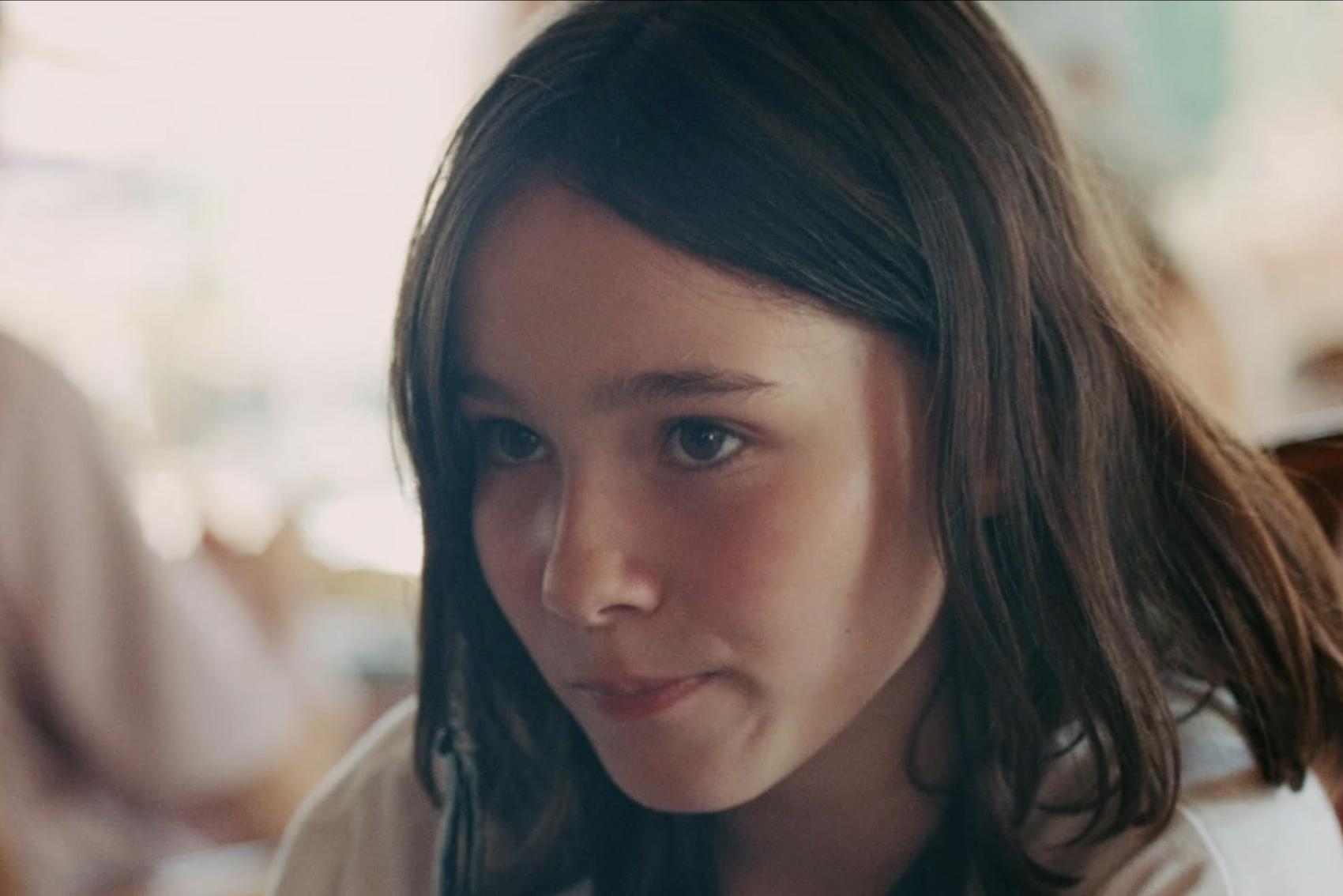 |
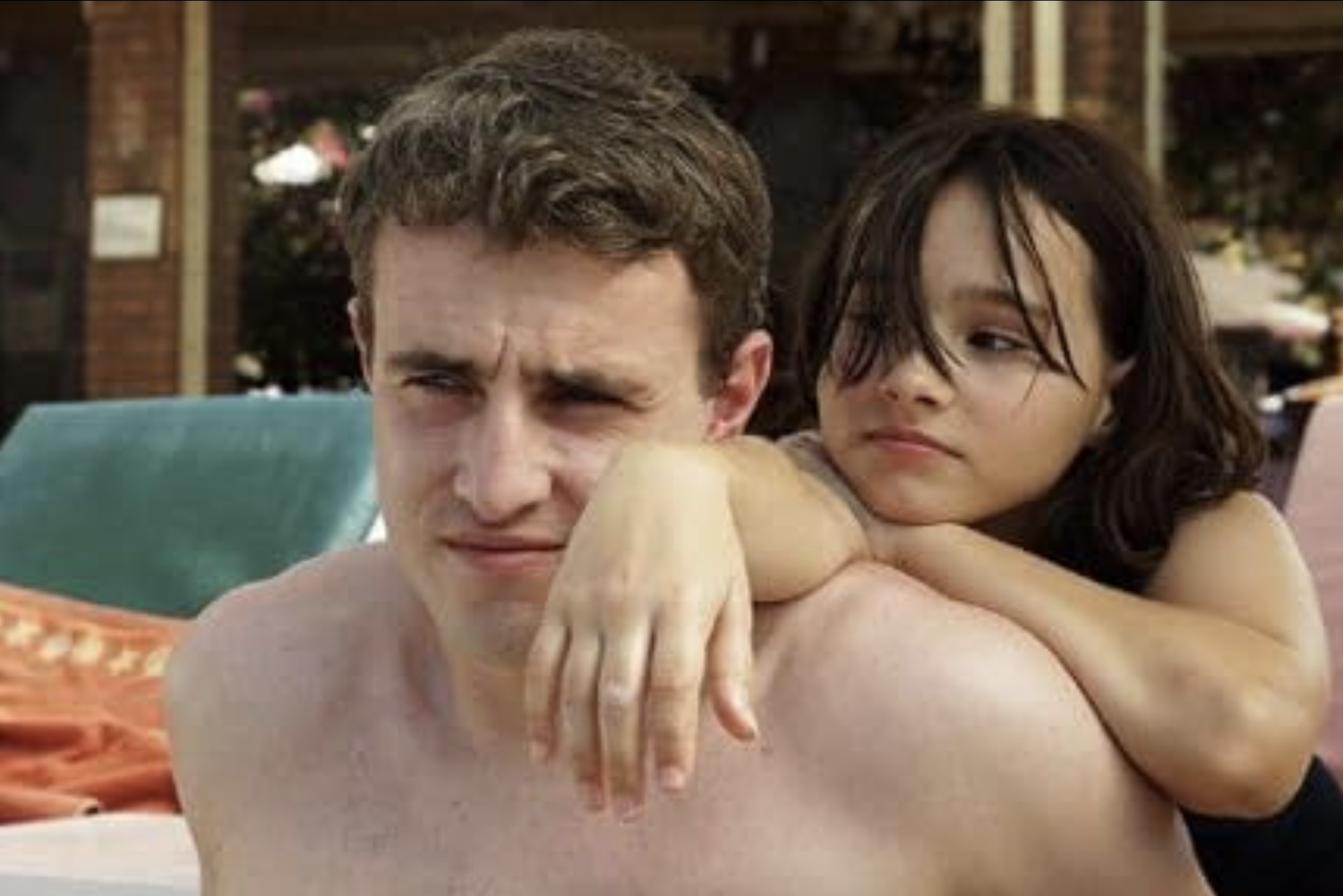 |
| Frankie Corio in „Aftersun“ © A24 Films LLC | Paul Mescal und Frankie Corio in „Aftersun“ © A24 Films LLC |
Would you say you have a responsibility to the actors?
Yes, of course, because with first-timers, they often didn't know that they wanted to do this before we approached them, so we're opening a door. We have to hold their hand as they go through the door, and we have to hold their hand after they come through the door, after they've finished filming, and until they don't need us to hold their hand anymore. It is a conversation I have with filmmakers if they've not worked with first-timers before, that this is the beginning of a relationship. Yes, it is a work relationship, but the relationship continues even after the film is finished, and the responsibility continues especially to any of the young people, whether they have acted before or not.
Do you like the term „street caster”? It sounds romantic, but the work is incredibly hard.
How do you feel about this label?
Well, I don't mind the term street casting, but I think you can end up in a little bit of a silo. I've had people say to me, „You really only do street casting, don't you?” Yes, it's something I have lots of expertise and experience in, but it's not the end of my abilities. It's a very important foundational part that I will never not do. But there are other strings to my bow as well.
How have technologies like Spotlight, IMDb, and social media changed the casting process?
For me, it means you can reach a much wider group of people. On „Aftersun“ we were lucky to have the awesome power of parental WhatsApp groups to help spread the word about the opportunity! As casting teams, we have a responsibility to make sure that we operate to a high standard to show people: this is how it's properly done. There are people out there who claim to be doing castings just to get personal information.
But you also work with databases like Spotlight for professionals and IMDb and then use social media as a research tool. How do you balance these approaches?
We would only use social media if we were doing a street casting, a non-professional push. If we're looking for represented actors, we will put things out on Spotlight and then have to look through hundreds of people for each role. Particularly at the moment, large numbers of actors come forward for each role or are put forward by their agents. It's a really helpful resource. We haven't put newspaper ads in for a really long time, because few people read physical newspapers in the way they once did . But when we meet somebody in person, we hand out little business cards; that tends to be more effective than flyers.
How do you approach casting for an ensemble, like in Rocks? Was there a central figure you found first?
For Rocks, director Sarah Gavron and I researched in two schools and a youth club for nine months. We went every single week, more or less and sat in the same classes each time, getting to know the girls in each class. When we came to cast the film, we opened up the process and went into 14 schools and met thousands of girls, including all the girls we met during the research. We invited everybody to come in with their friends, so sometimes you'd see two people at a time and sometimes you'd see ten. We had met Bukky, who now plays Rocks, in one of the schools where we did the research. And Bukky said that she probably wouldn't have come to the castings if we hadn’t sat in her drama class for months.
Once we had selected a shortlist of about ten girls, we brought them in for regular workshops to build chemistry within the group. We didn't know up until quite far into the process who was going to be playing who. Through the workshopping, through connecting with each other regularly, they built up friendships, and of these. The friendship between Bukky and Kosar was particularly warm and close.
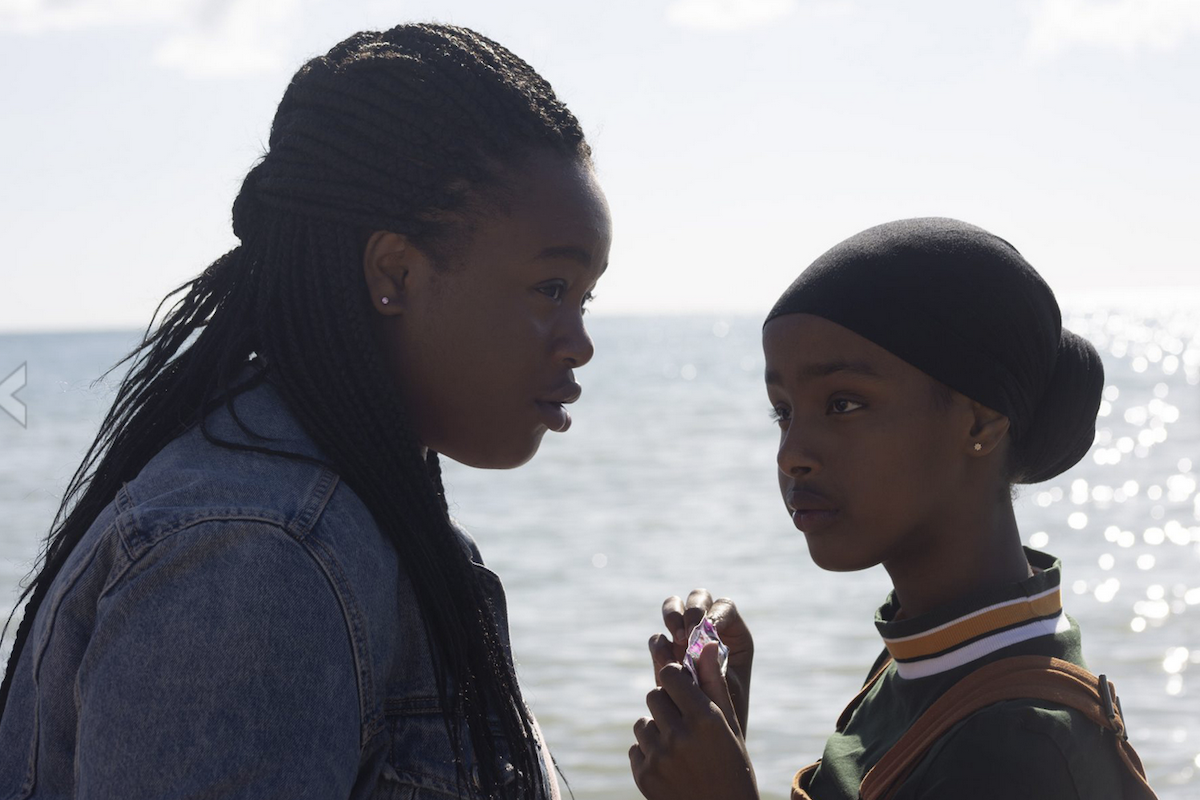 |
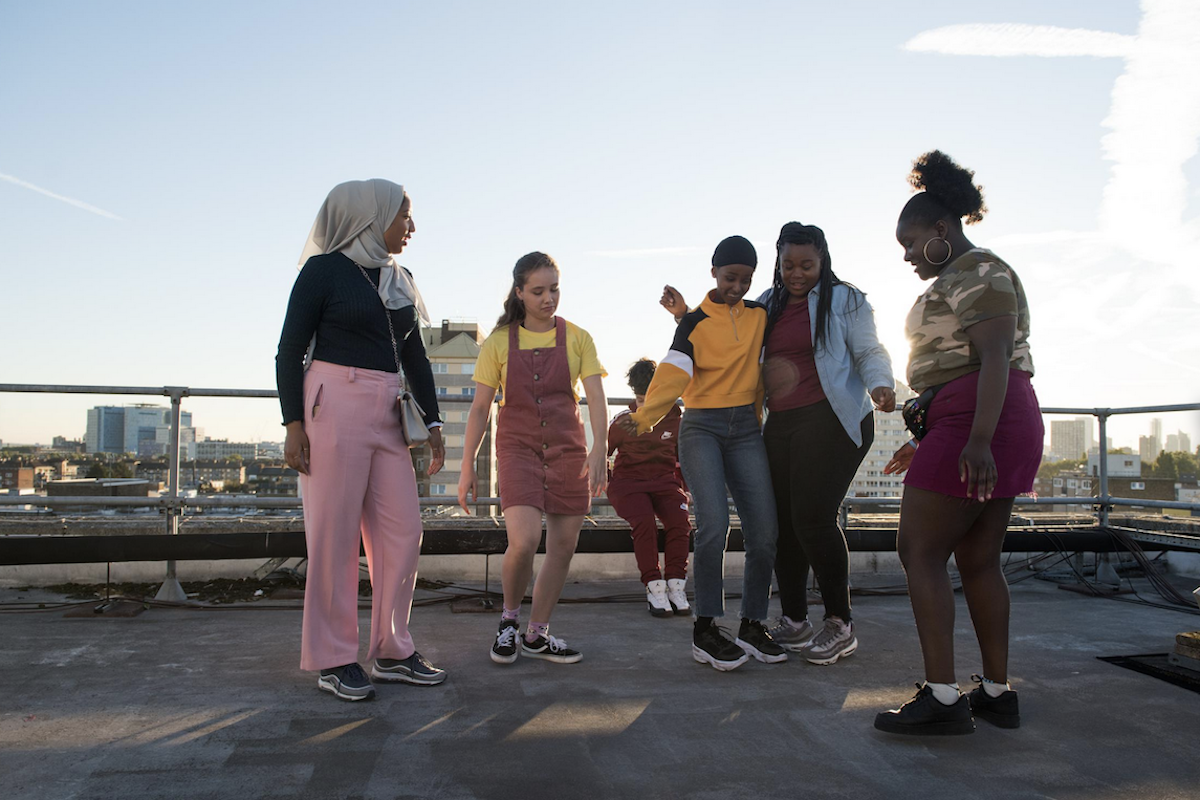 |
| Bukky Bakray and Kosar Ali in „Rocks“ © Altitude Media Group |
Bukky Bakray, Kosar Ali and other actresses in „Rocks“ © Altitude Media Group |
The next one is one of my favourite films as well: American Honey.
What was the biggest challenge in casting this movie?
American Honey was very tricky, and it was probably the hardest project I've ever worked on, partly because it confronted me with the challenges of being a working mum. My son was only two years old when we started, which combined with working . American hours made the whole process feel like the longest marathon of my life. I worked with an American casting director called Jennifer Venditti,but it was still extremely hard to juggle everything, including periods away in the States. My son is thirteen now.
In Europe, casting directors often cover everything, while in the US, there are more specialised roles.
How does this difference impact the casting process?
The exciting part of casting is working with the director to create the mosaic of the entire cast, not just the leads. To some degree, casting determines tone as much as the production designer and the cinematographer. My team, my casting associates, will sometimes take on the day player roles, while I will have a much firmer hand on the leads and the supporting roles. But I have oversight over every single role. In America they have local casting directors because of the sheer scale of the country that you need local experts who know the local talent pool really well, but in the UK we do everything as our pool is smaller.
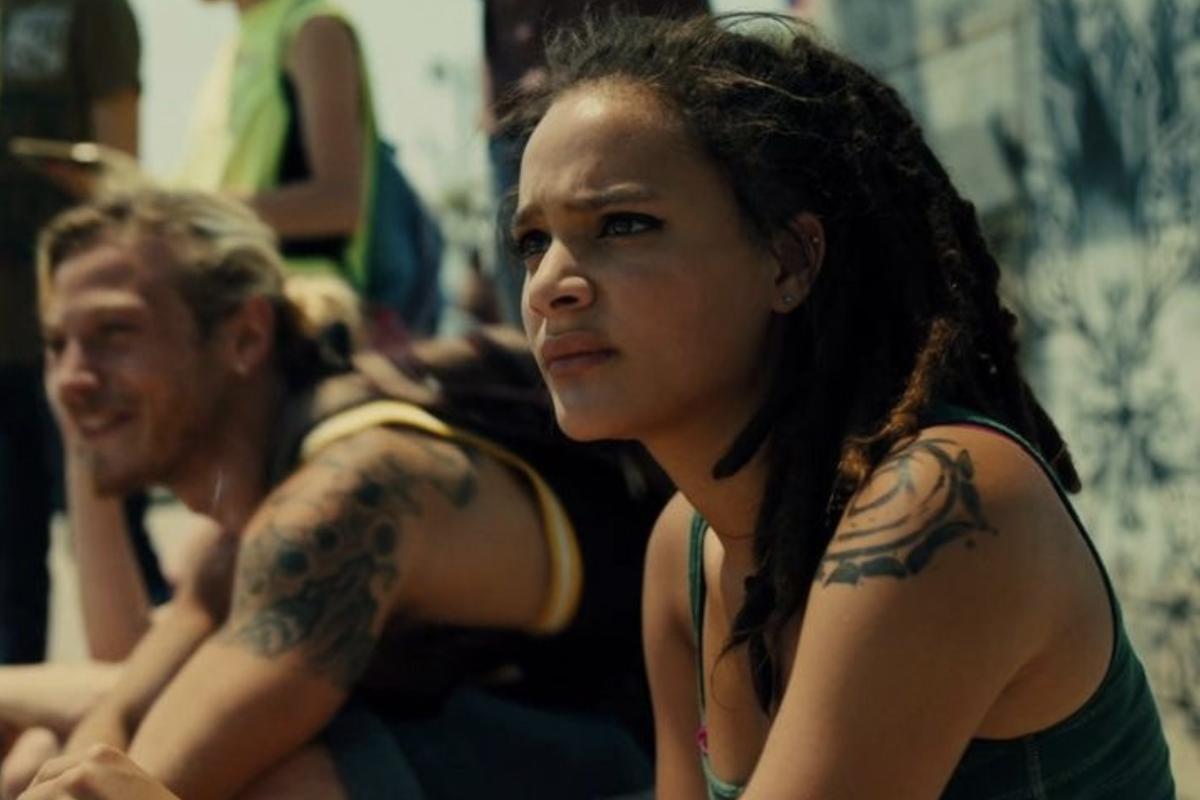 |
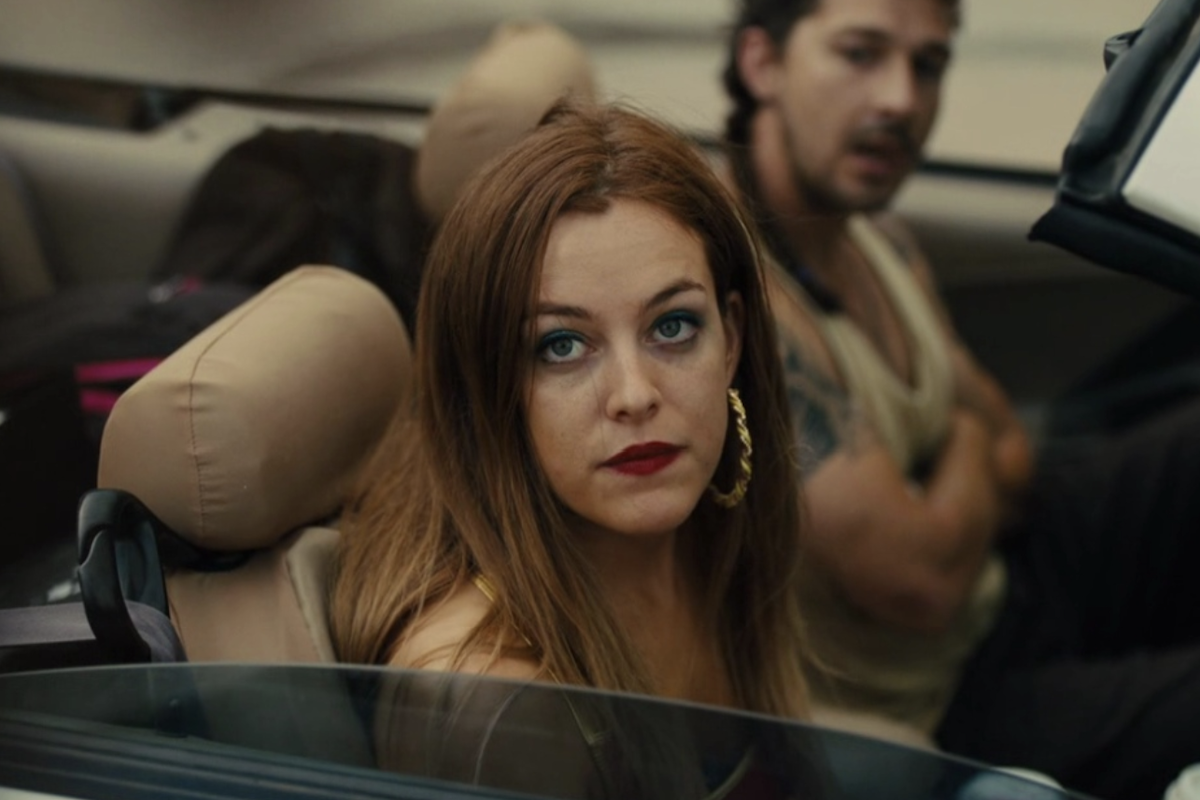 |
| Sasha Lane in „American Honey“ © A24 Films LLC | Riley Keough in „American Honey“ © A24 Films LLC |
How do you work with directors, producers, or editors to find the perfect cast?
Are you given strict guidelines, or are you free to exercise creativity?
It depends on the filmmaker. I'm really only attracted to the projects where I can exercise my creativity. Collaboration is a big part of it.We don't just work for the director and producer; we work with them together. I'm very lucky; I work with a lot of really fantastic experienced and first-time filmmakers.
What is the most common mistake actors make during auditions, and how can they avoid it?
I don't know what it's like in Germany, but currently in the UK actors are not getting auditions in the room very much. I do bring people into the room because it's so important for me to be able to play. I need to have them in the room in order to explore with them. Young people today can be quite fearful. They don't have a lot of experience in the room because everything is focused on self-taping.That’s one skill, but being in the room is also a skill that needs to be built. And some of the young people I'm meeting are scared to make choices. My advice is to make choices, even if it is the wrong one ultimately, at least you are trying things.
Do you prefer to be completely surprised during auditions, or do you expect actors to stick closely to the provided scene and direction?
This is why I like being in the room. I'm in the room and someone comes in, they walk into the room, they sit down, we have a conversation, and I will get an impression of them. And that's helpful for me because it means that I can then see what feels truthful. I am drawn to naturalistic performances because of the connection to truth that feels very direct. I look for truthfulness. So it may well be that it's not completely what the characteristic description is, but if it feels truthful, it will jump out to me.
Your awards and recognition, such as the Semiramis Award and BAFTA nominations, are remarkable.
What impact do these honours have on you personally and professionally?
It has been very meaningful for me to have recognition from my peers, particularly because I came from an unconventional route into the industry , and at times it has been difficult not to feel like an imposter. Winning a BAFTA made a massive impact. That was a game changer for me. It put me on a different level. Also, because I was then nominated for another BAFTA, that then meant that it wasn't a fluke the first time!
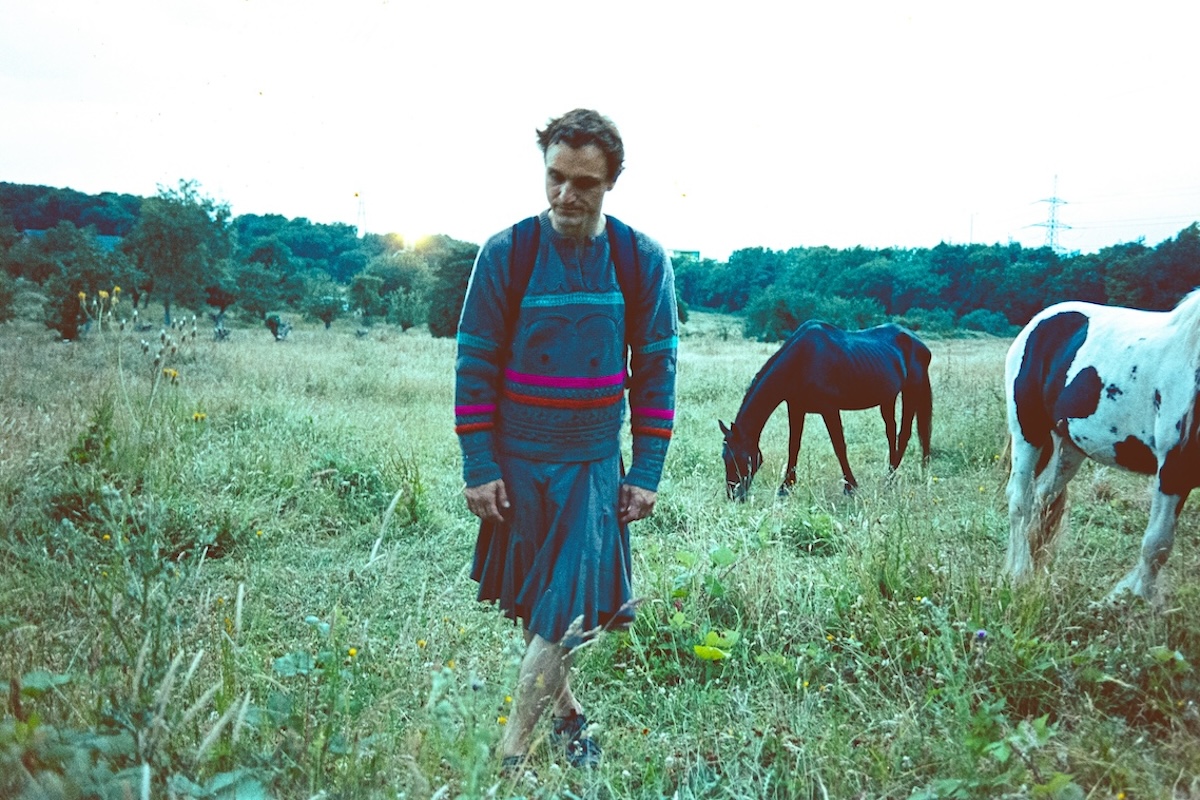 |
 |
| Franz Rogowski in „Bird“ © Robbie Ryan/2024 House Bird Limited |
Nykiya Adams in „Bird“ © Robbie Ryan/2024 House Bird Limited |
What advice would you give to productions looking to work with non-actors, apart from the obvious suggestion of paying the casting team appropriately?
I don't know if it's the same in Germany, but certainly in the UK there is a disproportionate representation of privileged people within our acting group and also people from white backgrounds. Especially when you're doing street casting, productions need to trust the casting team and have faith in their workflows.
If you've committed to telling the story that centres around somebody from an under-represented group, you have to provide enough scope for your casting team to do it properly; in the end, the entire film hinges on it. Production companies are getting better about that in my experience. But if they won't do it, then we won't do it. It's as simple as that. We have to be able to do it properly, which means covering enough ground and having enough time to do it.
For „Aftersun“, how many weeks did you have?
For „Aftersun“, we intensively looked for about three months, but the actual process itself was six months. And „Bird“ was a very long time - not full-time, but about a year. We have a fallacy in the British industry, which is if you want it badly enough, you'll make it happen for yourself. That's such a middle-class way of thinking. If you have grown up not seeing experiences or people like you on screen telling stories, why would you imagine that for yourself? There are real barriers that exist that stop people from both entering the industry and succeeding within it.
If you had to put 20 years of casting into one sentence.
What remains closest to your heart about the work you do?
All of the people I get to work with and meet. That's the thing. I mean, what a privilege that we get to do a job that allows us to move towards people. That's the thing that I love the most about my job, be it actors or first-time actors. My job is about moving towards people. And I never come out of a project feeling like I haven't learnt something about human connection or learnt something about the world. And I think that's the reason why I keep going.
Lucy is also a proud member of the Casting Directors' Guild.
Represented by Humphrey Elles-Hill at Independent Talent for All Project Enquiries.
https://lucypardee.com/
Awards:
BAFTA: Best Casting (Winner, „Rocks“ 2021; Nominee, „Aftersun“ 2023)
BIFA: Best Casting (Winner, „Rocks“ 2021; Nominee, „Aftersun“ 2023)
Critics Circle: Technical Achievement (Winner, „Rocks 2021)
ICDN Semiramis: Best Casting (Winner, „Rocks“ 2021)
Österreichischer Filmpreis: Best Casting (Nominee, „Club Zero“ 2024)
BIFA: Best Casting (Nominee, „Bird“ 2024)
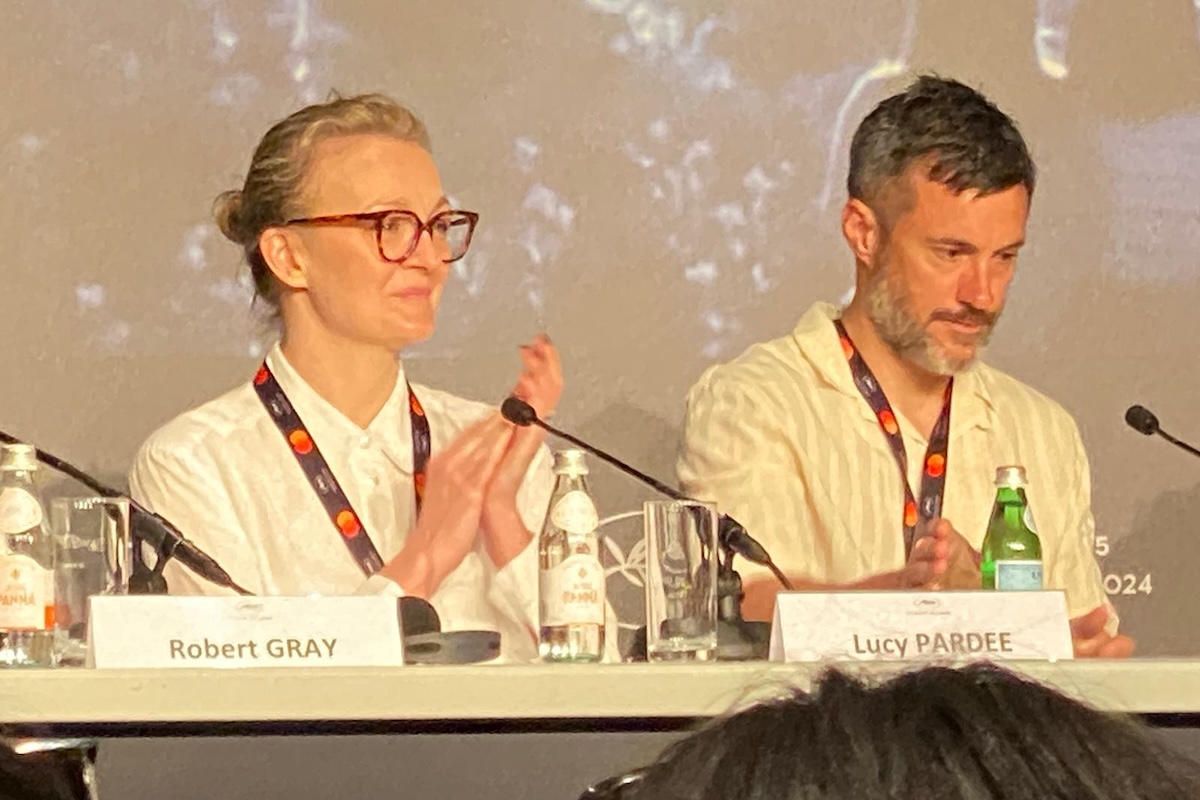 |
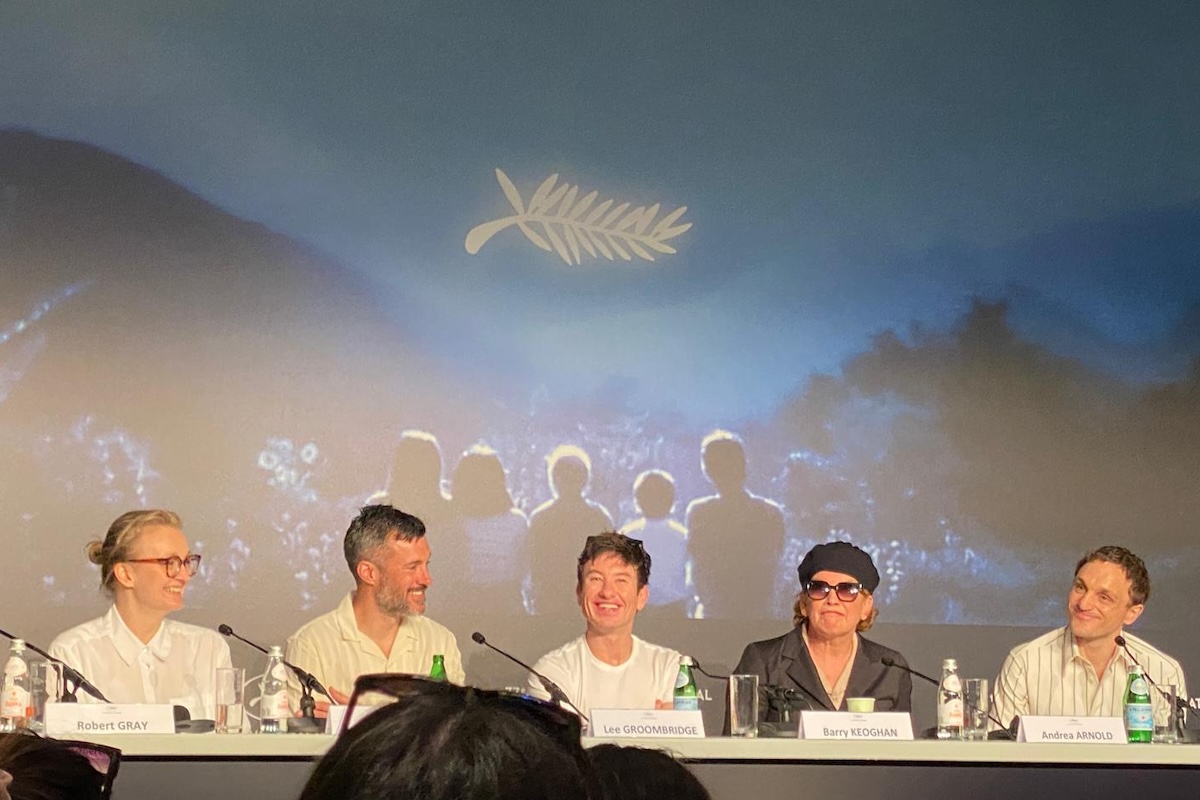 |
| Cannes press conference 2024 for „Bird“. Alongside the actors, | Andrea Arnold also brought Lucy Pardee into the panel |
| © Tina Thiele |
Tina Thiele
Zum Seitenanfang Seite drucken


